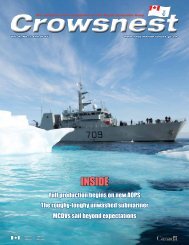Create successful ePaper yourself
Turn your PDF publications into a flip-book with our unique Google optimized e-Paper software.
Broader-based international cooperation would most effectively contribute to addressing many <strong>of</strong><br />
<strong>the</strong> challenges associated with maritime security <strong>and</strong>, in <strong>the</strong> coming years, governments will be<br />
confronted by issues for which multilateral approaches would be, objectively speaking, <strong>the</strong> most<br />
efficacious. That should not be surprising for, as a US thinker has recently pointed out, <strong>the</strong><br />
diffusion <strong>of</strong> power in <strong>the</strong> international system implies a diffusion <strong>of</strong> responsibility for<br />
its management. 303 In an ideal world this would be so, but <strong>the</strong> grammar <strong>of</strong> international<br />
politics—<strong>and</strong> maritime security is all about politics—is defined by power, interests <strong>and</strong> values<br />
informing an individual country’s assessment <strong>of</strong> its maritime security needs that in many (perhaps<br />
even most) situations will not be shared by o<strong>the</strong>r countries. Consequently, <strong>the</strong>re will continue to<br />
be national disagreements that will generate constraints on <strong>the</strong> most logical approaches to oceans<br />
management <strong>and</strong> this will become more evident as ocean politics intensify. Already, some<br />
commentators have observed that <strong>the</strong> “tone <strong>of</strong> maritime tensions” today is far more adversarial<br />
than it was in <strong>the</strong> 1990s. 304<br />
Regardless, international cooperation cannot be precluded in specific issue-areas. <strong>The</strong>re are<br />
several examples that have already paid dividends. Counter-piracy, in particular, has witnessed<br />
international agreement on both <strong>the</strong> need <strong>and</strong> methods to be followed. In 2004, 16 countries<br />
negotiated <strong>the</strong> Regional Agreement on Combating Piracy <strong>and</strong> Armed Robbery against Ships in<br />
Asia (ReCAAP), <strong>the</strong> first time a binding multilateral agreement to deal with piracy was<br />
approved. 305 By 2015, three o<strong>the</strong>r countries joined, so that ReCAAP’s membership includes both<br />
regional <strong>and</strong> four European states with interests in <strong>the</strong> safety <strong>of</strong> merchant fleets operating in Asian<br />
waters. While ReCAAP’s focus is on information sharing <strong>and</strong> includes provisions for capacity<br />
building, it includes an obligation to assist in <strong>the</strong> suppression <strong>of</strong> piracy. 306 More globally, in<br />
December 2008 <strong>the</strong> UN Security Council endorsed <strong>the</strong> application <strong>of</strong> <strong>the</strong> Convention for<br />
Suppression <strong>of</strong> Unlawful Acts against <strong>the</strong> Safety <strong>of</strong> <strong>Maritime</strong> Navigation. Two weeks later, in<br />
early-2009, <strong>the</strong> Contact Group on Piracy <strong>of</strong>f <strong>the</strong> Coast <strong>of</strong> Somalia (CGPCS) was created to<br />
coordinate <strong>the</strong> efforts <strong>of</strong> contributing states, international organizations, <strong>and</strong> industries concerned,<br />
on all relevant aspects <strong>of</strong> combating piracy. 307 A shared interest also led to Chinese, Russian, EU,<br />
Canadian, Indian, Japanese, <strong>and</strong> US naval <strong>and</strong> coast guard vessels have successfully worked<br />
toge<strong>the</strong>r in <strong>the</strong> Indian Ocean on counter-piracy operations. 308 Additionally, <strong>the</strong>re have been<br />
international agreements since <strong>the</strong> events <strong>of</strong> 9/11 on more focused maritime security issues,<br />
including <strong>the</strong> Proliferation Security Initiative (PSI), <strong>the</strong> Container Security Initiative (CSI) <strong>and</strong> a<br />
series <strong>of</strong> amendments to <strong>the</strong> Safety <strong>of</strong> Life at Sea Convention (SOLAS).<br />
303 Charles A. Kupchan, No One’s World: <strong>The</strong> West, <strong>The</strong> Rising Best <strong>and</strong> <strong>the</strong> Coming Global Turn (Oxford<br />
University Press, 2012), p. 197.<br />
304 James Manicom, “<strong>Maritime</strong> Security <strong>and</strong> <strong>the</strong> Canada-China Relationship”, OpenCanada.org, Canadian<br />
International Council, 19 March 2013 [accessed on 24 January 2014 at http://opencanada.org/features/<strong>the</strong>think-tank/comments/maritime-security-<strong>and</strong>-<strong>the</strong>-canada-china-relationship/].<br />
305 Kraska, Contemporary <strong>Maritime</strong> Piracy, p. 145.<br />
306 Tara Davenport, “Combating Piracy <strong>and</strong> Armed Robbery in Sou<strong>the</strong>ast Asia: An Evolution in<br />
Cooperation”, in Nordquist et al., Freedom <strong>of</strong> Navigation <strong>and</strong> Globalization, pp. 37–38.<br />
307 Kraska, Contemporary <strong>Maritime</strong> Piracy, p. 144.<br />
308 Such cooperation can also pay national dividends. <strong>The</strong> PLA(N) has benefitted from participation in<br />
counter-piracy operations in <strong>the</strong> western Indian Ocean. In addition to enhancing <strong>the</strong> pr<strong>of</strong>ile <strong>of</strong> <strong>the</strong> navy in<br />
<strong>the</strong> eyes <strong>of</strong> <strong>the</strong> country’s leadership, participation has provided essential training opportunities that have<br />
advanced its ability to undertake expeditionary operations. See O’Rourke, China <strong>Naval</strong> Modernization:<br />
Implications for U.S. Navy Capabilities – Background <strong>and</strong> Issues for Congress, pp. 29–31.<br />
64 DRDC-RDDC-2016-R085




